Seated on the team bus next to each other, Rick and Sonny Dykes felt the moment hit them at the exact same time.
Maybe it was their sibling senses or just pure coincidence. Either way, about two hours after TCU, a touchdown underdog, knocked off No. 2 seed Michigan in the College Football Playoff semifinal at the Fiesta Bowl on New Year’s Eve, the two brothers looked at each other and broke out in laughter as the team bus sped away from State Farm Stadium.
They almost simultaneously blurted out the same phrase.
How the hell did we end up here?
“I still pinch myself,” says Rick, 10 years older than 53-year-old Sonny, TCU’s coach. “There’s never been a team like this in the history of college football.”
In the modern era of the sport, TCU represents the first true Cinderella team to compete in the national championship game. Unranked to start the season and picked to finish seventh in the Big 12 conference, the Horned Frogs (13–1) have stunned the country with rousing comebacks and upsets against the sport’s blueblood powers. They’ve won six games after trailing by double figures in the second half and won three of those with last-second scores. They walloped Oklahoma in October, won at Texas in November and knocked off the Wolverines in last week’s semifinal—and now, they enter Monday’s title bout against defending champion Georgia (14–0).
Only a decade ago, the private school tucked within the bustling cowtown of Fort Worth was classified as a mid-major program and still holds a fraction of the athletic budget of most of its competitors.
On top of it all, the Frogs have produced one of the most improbable one-year turnarounds in the sport’s history. They fired legendary coach Gary Patterson 14 months ago after a 5–7 season and hired a Texan who himself had previously failed as a major college head coach.
So the question is quite a good one: How the hell did Sonny Dykes and TCU end up here?
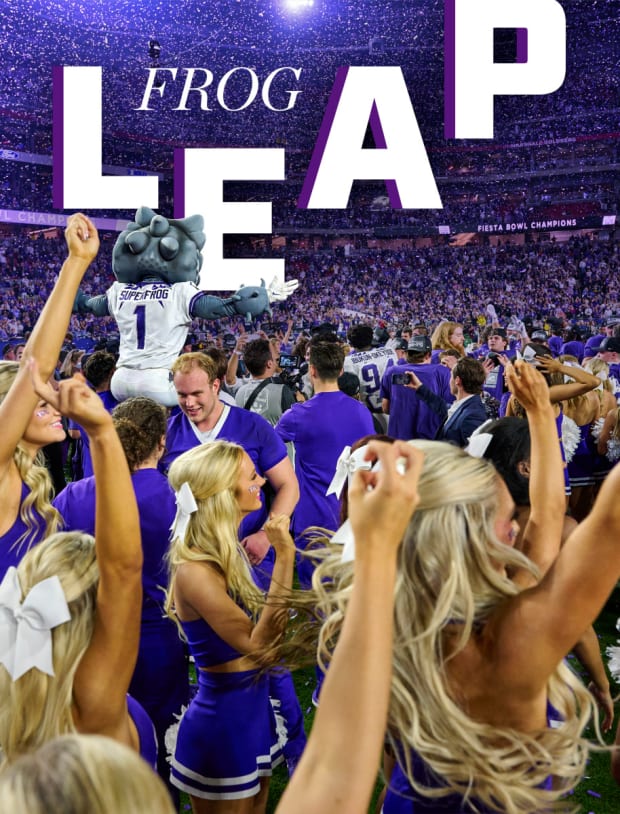
John W. McDonough/Sports Illustrated
Outside of TCU’s basketball arena, paces from the gates of its football stadium and square in the middle of the school’s cozy campus, Patterson’s bronze likeness stands tall—his arms folded, his face sporting an intense stare, a whistle draped around his neck and a visor resting atop his head. The statue was erected in 2016 as a way to honor a man who eventually finished his career with 181 wins, 11 bowl victories and six top-10 finishes over a 20-year head-coaching career in Fort Worth.
His run ended in 2021 on Halloween morning, when school officials told Patterson (and his wife, Kelsey, who he brought to the meeting) that they wanted him to step down after the season ended. In disagreement over the move, Patterson resigned immediately.
“If it had come at the end of the season, maybe I would have made a different decision, but after 25 years, how do you … you’ve got to look at that,” says Patterson, now a defensive analyst on staff at TCU’s rival, Texas.
TCU athletic director Jeremiah Donati, who hired Sonny Dykes and fired Patterson, believed the decision needed to happen before the end of the season due to the coaching hiring cycle that has become accelerated by the early signing period and transfer portal era. It was a complicated mess for Donati and an awkward situation for Dykes. He replaced a fired coach of which the school had erected a statue.
“I don’t know that anyone has ever done that,” Dykes says. “It’s very unusual.”
Making it even more uncomfortable: Dykes joined Patterson’s staff as an analyst in 2017 after he was fired by Cal. After four up-and-down seasons on the West Coast, the role was an entry point into coaching in the Dallas–Fort Worth area that eventually helped SMU hire Dykes a year later. His stint at SMU made him an attractive option for TCU.
It’s all come full circle, a cascade of coaching dominoes that elicits a chuckle from Patterson. In a way, he started all of this. “No hard feelings on that kind of stuff with Sonny and [Kelsey],” Patterson says. “This is part of college football. At the end of the day, I’m excited for them.”
Like most coaches who have been in the industry for years, Dykes and Patterson built a relationship. It started with Spike Dykes, Sonny’s father, who coached high school football in West Texas and then presided over Texas Tech for 14 seasons. Patterson recalls visiting Spike’s Tech program a few times. Years later, Sonny paid a visit to one of Patterson’s practices.
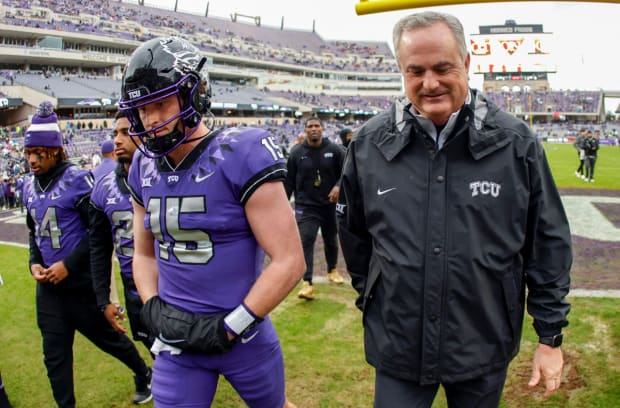
Ron Jenkins/Getty Images
“I was appreciative of him for hiring me in 2017,” Sonny says. “I think the world of Coach Patterson. There was nobody invested in a football program more than Gary was invested here. When things ended the way they did and you’re as invested as he was, that’s hard. It’s a tough thing to go through.”
Patterson’s consistent success in Fort Worth turned TCU into an attractive location. When he arrived in Fort Worth in 1998, Patterson recalls team meetings transpiring in an old weight room. There was no indoor practice facility, and, when the school finally built one, it wasn’t air-conditioned.
During Patterson’s time in Fort Worth, including three years as an assistant under Dennis Franchione, TCU participated in four leagues: the Western Athletic, Conference USA, Mountain West and Big 12. The school went from competing against league foes such as New Mexico and Hawai’i to facing conference powerhouses like Texas and Oklahoma.
Through the tumultuous ride, the program won at least one championship in each league despite its size. TCU is one of the smallest schools among the 65 programs in the Power 5 conferences. The school has an enrollment that normally hovers around 10,000 and an athletic budget of roughly $80 million. That’s less than half the budget of in-state giants Texas and Texas A&M and a fraction of middling SEC programs like Arkansas and Ole Miss.
“TCU had to improve some things, and that’s usually what happens when you bring a new guy in,” Patterson says. “You improve some things.”
Since Donati’s time at TCU, the school has invested more than $400 million in facilities, and it recently announced a new Human Performance Center that will feature all the trappings of other high-level football centers across the country.
“This all means that money doesn’t buy championships,” Donati says. “The premium is on coaches and players. Resources are important, but they’re not the only part of the equation. We are well-resourced, but do we have the most? No, but we have enough.”
As a coach, Sonny Dykes is unafraid to gamble on fourth down, call the occasional trick play or match wits with some of the game’s brightest minds.
As a child, Sonny Dykes was just as fearless.
Rick Dykes once built a bike ramp for his little brother along a steep hill in the family’s backyard that led into a creek bed. Sonny went around and around on his bike, riding off the ramp, dropping some 10 feet onto the slope and rolling into the ravine.
“We made him wear a football helmet and shoulder pads. My mom had a cow when she saw it,” Rick says. “He has no fear.”
Rick, Sonny and their sister, Bebe, were raised in several tiny towns in west Texas as the family struggled to make ends meet. They seemed to always be on the move, relocating to wherever their father found his next high school head coaching job. They lived in Eastland (population: 3,900); Ballinger (3,700); Coahoma (817); Belton (23,000); and Alice (19,000). Spike, who also drove the morning bus, was fired from one school after kicking the superintendent’s troublemaking son off and making him walk the rest of the way to school.
In Coahoma, the Dykes home was in such disrepair that Rick once fell through the thin drywall in his bedroom and landed in the backyard. Spike slid an empty moving box full of rocks against the hole in the wall.
Fixed!
“I can remember him bringing home huge blocks of cheese from the school cafeteria,” Rick says. “That’s what we ate. Grilled cheese, mac and cheese, cheese sandwiches.”
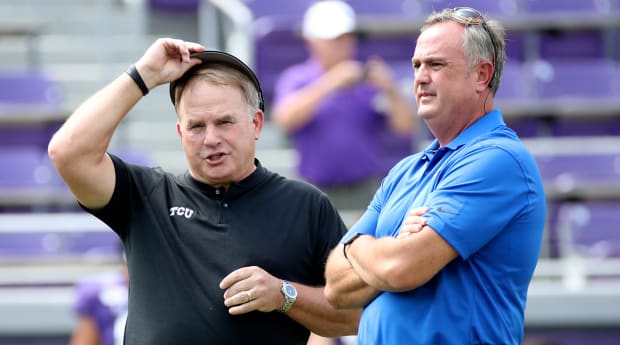
Kevin Jairaj/USA TODAY Sports
By the time Sonny reached school age, Spike had made it as a college assistant. When Sonny was 17, Spike landed the head coaching job at Tech. Before leaving coaching for the private sector in 2003, Rick coached with his father for a decade in Lubbock. Spike was a humble, hard-working man who treated everyone equally, including his son. During one meeting in Spike’s office, Rick told his father that one of his offensive players was a troublemaker. The player wouldn’t attend class or study sessions, and showed up late to practice.
“There’s nothing more I can do,” Rick said.
Without missing a beat, Spike looked up at his son and quipped, “Well, I hate to hear that. I’ve really enjoyed having you on the staff.”
Sonny is a lot like their father, Rick says. He is fairly laid back, quiet but intense when he needs to be. He’s a great manager of people, builds strong relationships with players and staff, and recruits with the best of them.
Schematically, he operates a version of the Air Raid offense derived from his mentors Mike Leach and Hal Mumme. Spike and Mumme were close friends from their time as coaches in Texas. One year Mumme hired Spike to speak at a coaching clinic and then couldn’t pay him. “I sent him cowboy boots instead,” Mumme says with a laugh. In 1997, Spike phoned Mumme for a favor: Hire my son. Mumme, then coaching at Kentucky, gave Sonny his first coaching break. Sonny’s second break came from Leach, who hired him and Dana Holgorsen to be co-offensive coordinators at Texas Tech. Leach assigned Sonny to recruit Dallas–Fort Worth and Holgorsen to the Houston metro area.
“We talked about that last year,” says Holgorsen, now coach at Houston. “Twenty-one years later, here we are back in the same place where it started.”
Sonny is Texas through and through—a simple man with a country twang, unapologetic and compassionate at the right times, a father of three who isn’t afraid to acknowledge a poor career decision. Like when he accepted the job at Cal in 2013. A Texas boy in Berkeley? Well, a year into Dykes’s tenure, athletic director Sandy Barbour left, and he soon followed with a 19–30 record.
“Probably better if I don’t say much about that,” Sonny says. “It’s just a hard place. I took a step out there without understanding what I was getting into. Texas is home for me. Dorothy said it best: ‘No place like home.’”
Deion Sanders. Tony Elliott. Billy Napier.
Any one of those three coaches could have been hired to lead the TCU Horned Frogs. Donati declined to release sensitive information about his search, but those with knowledge of the search tell Sports Illustrated that Dykes joined those three men as finalists for the job.
Sanders was coach at Jackson State, Elliott was offensive coordinator at Clemson and Napier was leading Louisiana. All four men participated in final interviews during Thanksgiving week in November 2021. Sanders’s interview was conducted on Zoom, as he was in a hospital bed recovering from a serious blood clot issue. For his final interview, Dykes arrived at a TCU donor’s home with no supplies, notes, binders, printouts, spreadsheets or slideshows. In true Texas fashion, he needed none of that.
“I remember him talking to us and me being ready to play for him,” says LaDainian Tomlinson, the former TCU star who is now on the school’s Board of Trustees. “He’s a rock star.”
The favorite from the start of Donati’s search, Dykes quickly won over the small search committee. “At one point, we looked at each other and said, ‘What are we waiting on? Let’s hire him,’” Donati says.
Dykes did have other options. As TCU’s search unfolded, another school had an open job: Texas Tech, where Spike coached, Sonny played baseball and Rick sits on the university president’s Athletic Council. Sonny chose Fort Worth instead of Lubbock. To his brother, it made sense.
“He had a staff who had recruited in that area with SMU. He likes Fort Worth as much, or better,” Rick says. “It all worked out the way it was supposed to.”
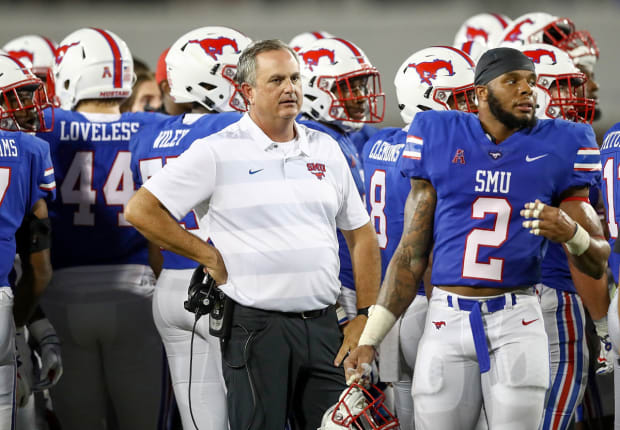
Ronald Martinez/Getty Images
For Sonny, it could not have worked out better. He figured so when he took the gig. “Coach Patterson has certainly mined a lot of gold here through the years,” he says of the program’s recruiting footprint.
The other three candidates have all landed new jobs since that search—Colorado hired Sanders; Virginia hired Elliott; and Florida hired Napier the week after his interview with TCU. Dykes left SMU for TCU in a historic move. His decision is believed to be the first time in the modern era of major college football that a head coach has left one school to directly join its primary in-state rival.
The move elicited such vitriol among Mustangs fans that Dykes immediately moved his family from Dallas to Fort Worth to save them from the nasty aftermath. More than a year later, icy relationships have thawed. SMU athletic director Rick Hart and Mustangs booster Bill Armstrong, who grew close to Dykes, say they have communicated with him and congratulated the coach on the latest run.
“We’re patching it up, but it still hurts,” says Armstrong, who detailed Dykes’s exit in an SI story published in September. “I’m happy for him.”
Dykes and his staff have turned a 5–7 team into a 13–1 CFP finalist in a matter of months. They are one of the most veteran teams in the country, regularly starting just one player in his first year. Quarterback Max Duggan is a four-year starter, though he’s been wildly inconsistent until this season. Half of the defensive starters transferred in this year from the portal as the staff plugged critical holes. The other half is mostly two- and three-star recruits identified by Patterson as players he could develop into stars.
And then there’s wide receiver Quentin Johnston, arguably the team’s most significant player who signed with the Horned Frogs over Texas as the second-highest-rated recruit in Patterson’s tenure at the school. He has more than 1,000 yards receiving this season. Add in a remade strength and conditioning program led by former Baylor strength coach Kaz Kazadi, a few fortunate breaks and opportunistic turnovers, and here they are—playing for the school’s second AP national title and first since 1938.
“When I went out to fall camp, I didn’t recognize the team from a year before,” Tomlinson says. “They looked fast, big—and just the structure of practice had changed. They looked like a championship team then. I said then, ‘We’re not going to finish in the middle of the pack.’”
Did he expect a 13–1 season?
“No, sir!”
After TCU beat Texas in Austin on Nov. 12, television cameras caught Patterson telling Duggan that he would attend the national championship game if his former team reached that point.
“I think it’s the right thing to do,” Patterson says.
He’ll likely be seated in a suite or club box in the sparkling $6 billion SoFi Stadium, where the Horned Frogs will meet No. 1 seed Georgia in Monday’s title clash in Los Angeles. Patterson still regularly communicates with many TCU players, and at least three of his former assistants were retained on Sonny’s staff.
He describes witnessing TCU’s march to the championship this year as “bittersweet.”
TCU lost just one game or none at all in four of his 20 seasons with the program. The Frogs went undefeated in 2010 as a member of the Mountain West and finished 12–1 in ’14, the first year of the four-team CFP in which the Frogs were left out in a controversial move that still irks many in Fort Worth. Now, Patterson will watch a team he mostly recruited play for it all a year after he was dismissed.
“You put 24 years of your life into a place, you wouldn’t want something like that to fail,” he says. “If you’re sitting in my shoes, yes, it is probably bittersweet. But at the end of the day, it’s good to see them get where they need to.
“This Monday is for all those guys, for all the people who have been part of this whole journey for 25 years. Because of those times, we are here. This is for the state of Texas, TCU, Fort Worth and for getting left out [of the CFP] in 2014.”
Patterson’s legacy in Fort Worth is unmistakable. He is the program’s all-time wins leader by more than 70 victories, has twice as many conference titles as the next-highest coach (six) and is a certain inductee into the College Football Hall of Fame (his career winning mark of 69% is well above the Hall’s 60% mandate).
And yet, while a statue of the man lurches over a portion of campus, he has not returned for a game or event. While he himself acknowledges frustration in the timing of his dismissal, he rankled many at TCU by, first, resigning mid-season and then accepting a job at Texas. That includes Tomlinson, who calls Pattrerson’s resignation a “low point.”
“If you went through a divorce,” Patterson says, explaining the decisions. “Would you want to live in the same town as your ex? I needed some space. A lot of people thought I went to Texas out of spite. No, I went to learn.”
Donati says he “welcomes the day” when Patterson wants to return to the program. The school offered the coach a high-level administrative role within the university, but he declined. During a more than hour-long conversation this week, Patterson spoke from his home in Fort Worth, not far from TCU’s campus. He and Kelsey will always keep their permanent home here, he says. He stayed in a condo this past fall while working in Austin.
Fort Worth is home to them. It’s a special place where he and his wife have left an imprint. The couple operate the Gary Patterson Foundation, which is dedicated to supporting children in and around the city and has raised millions of dollars.
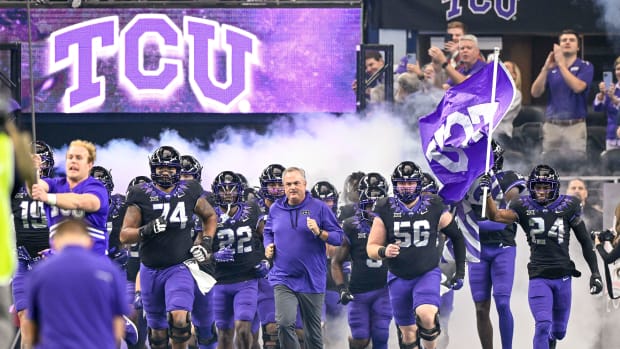
Jerome Miron/USA TODAY Sports
“Our legacy here is much more than wins and losses,” he says.
Meanwhile, his replacement is preparing for the biggest game of his career at an emotional time as well.
The 53-year-old Dykes has marched his team to the pinnacle of the sport a month after one of his mentors left this world. Leach died Dec. 13 due to complications from a cardiac-related event.
Amid practice for the CFP semifinal, Dykes attended Leach’s memorial in Starkville on Dec. 20, stayed for the full event and then showed up at an afterparty celebration of the coach’s life. As the time ticked down on TCU’s 51–45 win over Michigan, with his team in victory formation, Dykes says he thought about Leach and his father. Spike died in 2017 at age 79.
Not long after the game, Holgorsen called Sonny using FaceTime. They shared a special moment, two members of the Air Raid tree celebrating a stunning victory days after their mentor’s death.
“With this happening with Leach, it’s brought a lot of us closer together,” Holgorsen says. “It’s made you appreciate it and appreciate how special it is.”
As it turns out, this Friday and Saturday in Texas, Mumme and several members of the Air Raid coaching tree will descend on Waco for their biannual Air Raid convention. A certain TCU football coach was scheduled to speak at the event. He now has a scheduling conflict.
“I guess I’m going to let him off this time,” says Mumme.
No member of the Air Raid coaching tree has led his team to a national championship as a head coach. Of all the times to do it, maybe TCU’s magic ride is the one? Rick Dykes can imagine it now, sitting back on that bus, this time pulling away from SoFi Stadium with a national championship trophy resting between him and his brother.
How the hell did we end up here?
“I know my dad will be up there cracking up,” Rick says. “‘Boys, I can’t believe it either.’”







